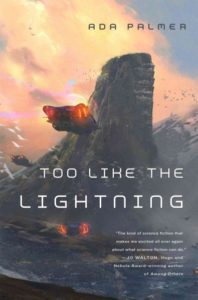 A very spoiler-heavy discussion of the bits I liked most about Too Like The Lightning follows.
A very spoiler-heavy discussion of the bits I liked most about Too Like The Lightning follows.
If you have any interest in reading the book, I would suggest doing so first, as having spoilers may significantly reduce your enjoyment of the novel – more so than most novels IMHO. But OTOH it seems like a fair bit of the reading public was not as heavily affected by the mid-book Reveal as I was. Still, please consider. This post will still be here in a week, or month, or year.
Ahem.
I – Mycroft
So, obviously I have to start with the Big Reveal that made me have to put down the book for X days. Since at least one commenter said he’s not sure which one I mean (there’s lots of twists and reveals), it’s obvious not everyone is as affected. I call it the Mycroft Reveal, wherein we get actual visceral details on the horrific crimes he committed.
I am, by nature, not a very forgiving person. This is tempered by the fact that it takes a lot to actually get me to the point of hating someone. But I have an ingrained sense that while people can change, very almost never actually do. And that no matter how much you change, your crime still hurt your victim, and your changes won’t fix that.
Palmer spends much of the first half of the book making me love Mycroft. He is humble, he’s smart, he does his best to help others. He’s charming, engaging the reader in conversation directly. Once he goes off on a tangent lamenting how visor should be spelled with a ‘z’ because it’s a futuristic-sounding word, and it’s not fair that it isn’t, and then the next time you see the word “visor” in narration its spelled “vizor” and you laugh out loud at his little rebellion (or you do if you’re me). He is shown to be a good person, and I like him.
And then you see that he’s a torturer, a rapist, and a murderer. Killing his foster family, people who loved and trusted him, in the most horrific ways he can, recording parts of it for media titillation. This is a person who deserves to die. A person who deserves to die by the most painful execution method we have available. Yet he’s still alive, and mostly happy, and I do not give a single fuck that he has changed, you made me like him!!
I was so pissed. I am still pissed, actually. Because current-day Mycroft seems to be a good person, and he has unique abilities that the world needs to keep running, and sure sure, he’s not a danger to anyone anymore. I still don’t care. I want him dead, and I’m not apologizing. If current-day Mycroft has to be snuffed out for past-Mycrofts sins, I’m OK with that.
Honestly, I feel like Palmer cheated. Because in real life, no one who does that sort of thing could ever be a good person. But since she can create the entire world, and the people within it, she can create this Literally Impossible situation where the person who could do those acts can somehow also be a good person. Because he was disturbed, and emotionally shattered. Because he was driven to it by a violent sociopath. Because he literally had to do these things in order to prevent world war that would result in basically a planet-wide Rwanda-style genocide/massacre. Isn’t it worth torturing your loved ones, in order to prevent that level of planetary horror? The utilitarian answer is yes. But this would never happen, this is equivalent to the 24-style torture-apologetics. It smacks of Ender’s Game-style genocide-apologetics. I can read about these people. But I will not sympathize with them. I reject any bid that I consider them equal human beings, and that I should forgive them. I leave that to the priests.
I was super-conflicted about this, because less than one week prior to that, I sat on the “Creating the Anti-Hero” panel at MALcon. I put forth the proposition that a good anti-hero is someone who pursues goals that we admire, but is forced to do so using methods we find repellant by their circumstances, and their emotional struggle with this. Firefly is the go-to example, as that show can legitimately be said to be about the villains of that universe. I always go with Watchmen, because I find both Rorschach and Ozymandias fit this perfectly, altho in opposing ways. In the end, Ozy prevents world-wide nuclear war. He saved the human race. And he only had to murder everyone in New York City to do it. I’ll be honest – I admire him. I think he is both a villain and a hero. Preserving the human race is a hell of a goal, and (to paraphrase Too Like The Lightning) you should be happy to sacrifice any subset of the world if you are literally saving the world, because you would have lost that subset anyway if the world ended PLUS everything else.
But that Mycroft seems to delight in it! Maybe I can thank him for saving the world. But I still want him dead. Call me human.
I did keep reading anyway.
Of course there’s three more books to come. Much is still to be revealed. My reactions are to this book alone. I hope they do not change though. I will have to wonder what it says about me if they do. This is what I meant when I said “this book is about your reaction to it,” altho again, it seems not everyone felt it hit home as deeply as I did.
II – The author as God
This novel reminded me of The Etched City in that both are about nominally mundane worlds wherein miracles suddenly occur, and people struggle to understand what the hell that means. But The Etched City takes place in a fictional world, in a pre-WW1 era. There are some simple firearms, but it’s enough in the past that it doesn’t feel contemporary. The furniture is Fantasy, not Sci-Fi. So having a miracle(s) produced by (one assumes) a god, didn’t throw me out of the story. In an Sci Fi setting, it kinda did. I finally got over this during one of the novel’s many dialogs, wherein J.E.D.D. says “the protagonist of every work of fiction is Humanity, and the antagonist is God.” (I was primed with an earlier reference to Greek Heroes being “beloved of the gods”)
I’m currently in the process of attempting to write a novel that grapples with a similar theme. So when I read this, what I saw is “the inhabitants of fictional worlds are put in awful situations by the author, for entertainment. The author has created them, and is responsible for everything in existence, and they have no say in the matter and exist in a separate reality that can never affect the author directly. The author is literally their God.” This is a massive Fourth-Wall Break, and it is done within the novel. Beautifully so. The inhabitants of this novel don’t know they are in a fictional world. The reader probably doesn’t realize they are creating that world in their mind, and that its framework was constructed by that world’s God, Ada Palmer.
The book keeps bringing us back to this theme with Jehovah, who I think has created a world of his own as well. At first I thought he was running a Reality Simulation on a supercomputer hidden somewhere. Later I thought maybe that supercomputer is his own mind, and the beings that exist in it are literally “thoughts in the mind of God”. By the end of the book I’m not sure anymore, as it is said that his powers mirror those of Bridger, and that Bridger is the God of the novel’s world.
This brings up interesting questions about Bridger. Is Bridger the author-insert in this story? Every other name in the book has major significance, and this would be the most significant naming of all – Bridger is literally the bridge that brings Ada-Palmer-The-Author from our real world, into the world she’s writing, as a character within it.
That’s why I became OK with Bridger having god-powers. Because if he is Palmer, then of course he can do anything. He is literally the author. There is no magic. There is only a reminder that these are words on a page, put there to stimulate my mind in ways the author thinks I will find enjoyable. If that means writing that plastic turns into flesh at a touch, then so be it. I accept that. It works for me.
III – Jehovah
Holy crap, Jehovah is awesome. Not just because he is a stone-cold badass. Not just because he strongly reminds me of one of my favorite anime characters, L/Lawliet. But because he is the me-insert in this novel. Other characters speaking of him – “Oh yes, [Jehovah really does hate this universe that much], He just doesn’t realize yet that what He feels is named hate.” And “if He met the callous Bastard who designed this universe of suffering, He’d… criticize, protest, scream […] if He did scream, if He wore His sacred throat to blisters screaming, this universe’s Maker wouldn’t care.” Oh. My. God. So good. All the sympathy, all the admiration. I hope to see so much more of him.
IV – Set-Sets
I love how Palmer whip-lashed my opinions of them. I loved them at first! They are what I aspired to be in my younger years. Renounce the flesh, live the mental life, upload if possible. I cheered at “you’ve never seen a six-dimensional homoscedastic crest up from the data sea, and you never will because you’re wasting those nerves on telling you your knee itches.” They have great personality and wit, they are people!
And then late in the book I discovered they never change. Never grow. And I was horrified. I was reminded of Diaspora, which finally truly drove home to me that Life Is Change. A person that is not changing can just as easily be replaced by a hard drive containing an archive of their thoughts. A species that doesn’t change can be replaced by a galaxy-sized statue made of memory crystal containing a saved state of all their simulated interactions. It was one of the most influential books on my personal view of what it means to be human. And these Set-Sets… they are things that were forced into mental stasis by their “parents”. They are not humans, they aren’t even people. They’re p-zombies. I shuddered.
OK, I think I got all of that off my chest. Whew! I’m looking forward to the next book!
 My short story “Host” is in the March/April issue of Analog Magazine, available right now. I’m ridiculously happy this got published, I was worried that due to its structure it would be unpublishable. My attempt at portraying Very Alien minds probably could have been much more explicit.
My short story “Host” is in the March/April issue of Analog Magazine, available right now. I’m ridiculously happy this got published, I was worried that due to its structure it would be unpublishable. My attempt at portraying Very Alien minds probably could have been much more explicit.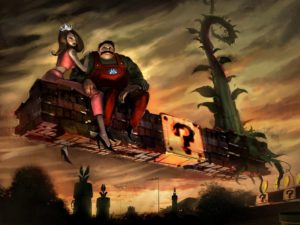
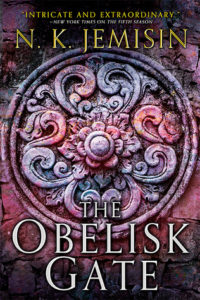

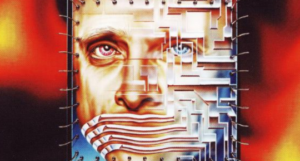


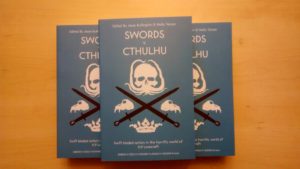
 Hey, you know the short story I wrote last year, “
Hey, you know the short story I wrote last year, “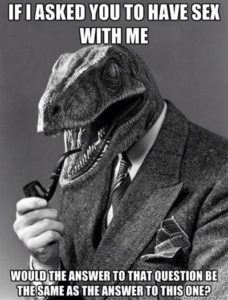 So um… being immersed in non-stop Hugo Controversy and Tinglers over the last two weeks does weird things to one’s brain.
So um… being immersed in non-stop Hugo Controversy and Tinglers over the last two weeks does weird things to one’s brain.